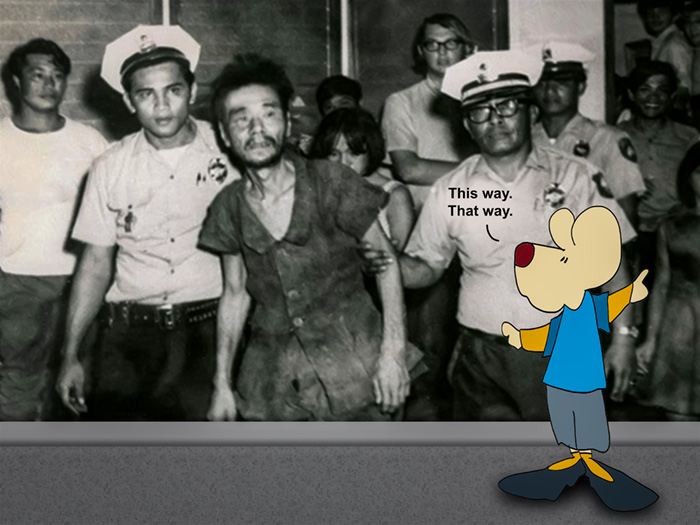Have you ever been lost?
That question, in itself, begs another question.
What is being lost, exactly?
It can mean all sorts of things, such as being unable to find one’s way. Not knowing one’s whereabouts. Like back in the days before GPS in our cars, and every so often, we wouldn’t know where Aunt Mildred’s house could possibly be.
Lost might mean that something can’t be found. Like our car keys.
Another definition comes when someone is extremely confused or having great difficulties.
There might be things that are long gone, like our lost youth. Or lost opportunities. Or maybe the crew of a boat was lost when they were swept out to sea.
Or finally, like being defeated in a competition. Like a presidential election.
Whatever the case, on some level, we have all been lost at times. Or lost something important to us. Or even lose a chance in life.
Yet, perhaps none of us have been so lost as Japanese Sgt. Shoichi Yokoi. Boy, oh boy. He was lost. It was on this date, January 24, 1972, when. Sgt. Yokoi was found hiding in a Guam jungle. He had been lost there since the end of World War II.
Shōichi Yokoi worked as an apprentice tailor when he was called to military service in 1941. He was 26 years old at the time. He’d go on to serve as a sergeant in the Imperial Japanese Army (IJA) throughout World War II.
His company went to fight in Guam in February 1943. But then, the American forces captured the island in the 1944 Battle of Guam. He realized they were defeated, and Yokoi went into hiding.
He was not alone to start with. He went into hiding with nine other Japanese soldiers. Seven of them were separated away, either by choice or by accident. Sometime after 1964, those two other guys died in a flood.
For the last eight years, Yokoi lived alone. He must have been one smart, resourceful guy, as he survived by hunting, most of the time, at night. He used the plants in the jungle to make clothes, bedding, and other survival items, which he carefully hid in his cave.
And that was Yokoi’s life. He hid in the jungle, fearing he might be captured by American soldiers occupying the island. He had no idea the war was over.
But what is lost is often found. On the evening of January 24, 1972, Yokoi was discovered by two local men checking shrimp traps along a small river near him. The men thought Yokoi was a villager from Talofofo. But Yokoi thought these guys were the enemy, and he attacked them. The shrimp men managed to overtake him and carried him out of the jungle.
Yokoi later said that he expected to be killed by those two guys. But instead, they took care of him, feeding him hot soup at their home. And then they alerted the authorities.
Yokoi, surprisingly was in pretty good health. He had survived mostly on nuts, mangos, papaya, shrimp, snails, frogs, and rats.
Of course, there was a whirlwind of media attention in Japan. And when that all calmed down, he married a nice gal. He also became a popular television personality. He touted simple living in his shows.
Yokoi died in 1997 of a heart attack at the age of 82. And this. He was buried under a gravestone that his mother had originally purchased in 1955 after Yokoi had been officially declared dead.
So the next time we experience being lost, in whatever that may be, we might want to remember Shoichi Yokoi, a man who was found when all else seemed to be lost.
Every day, finding ourselves in new and different ways.
====
“Not all those who wander are lost.”
― J.R.R. Tolkien
====
“When people say “it’s always the last place you look.” Of course it is. Why would you keep looking after you’ve found it?”
― Billy Connolly
====
“The quiet sense of something lost”
― Tennyson
=====
Something’s lost and can’t be found.
